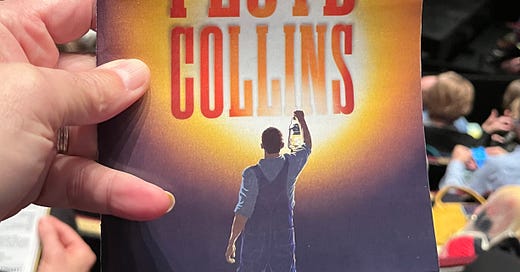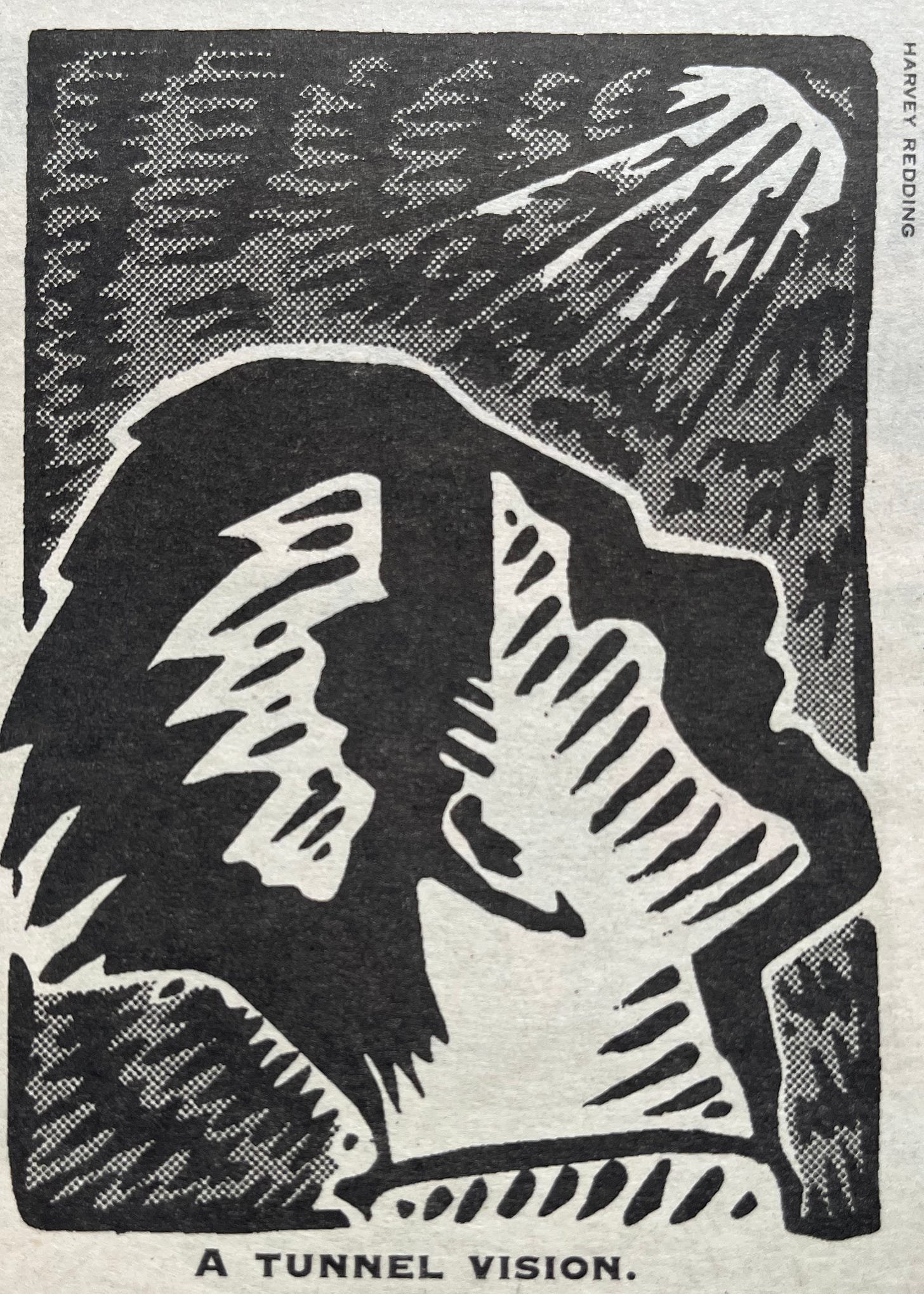Floyd Collins has become such a legendary and beloved work of musical theater that it’s hard to believe that its original production ran for only 25 performances at Playwrights Horizons in 1996. Its legend arises from three factors. One: musical theater buffs are fanatical about every show that comes down the pike. Two: original cast albums are sacred objects to musical theater fans. The best of them (e.g., virtually every Sondheim OCR) operate like “theater of the ear.” You can get almost everything about the show from the album, and that’s true of Floyd Collins. Three: Adam Guettel is among the most revered composers of his generation, best known for The Light in the Piazza, and as his first full-length score Floyd Collins showcases his astonishing originality.
After being produced by theaters all over the country, Floyd Collins is finally receiving its Broadway debut at Lincoln Center Theater, staged by Tina Landau, who also directed the original production as well as writing the book and co-authoring the lyrics with Guettel. I saw it the other night and appreciated it without ever being moved. I found myself struggling to grasp the essence of the piece. Is it about pipe dreams, a Kentucky-fried version of The Iceman Cometh? Is it about how media attention turns everything to shit? Is it about the existential folly of human craving for glory?
In the mid-1990s the novelist-playwright-activist Sarah Schulman and I collaborated on a theater review column for the New York Press, a free local rag that considered itself a cheeky alternative to the Village Voice. Our column was a kind of he-said-she-said deal; we would go to shows together and separately write about what we saw. We hardly ever disagreed strongly but we brought different worldviews to the project, which made for an entertaining read. (Sarah incorporated some of which she wrote for the column into her book Stagestruck: Theater, AIDS, and the Marketing of Gay America.) Floyd Collins was one of the shows we reviewed. When I go back and look at what I wrote back then, it’s not so different from how I felt after seeing the Lincoln Center revival. Here’s what I said.
Tina Landau and Adam Guettel's musical Floyd Collins at Playwrights Horizons is based on the true story of a Kentucky farmhand whose hobby was exploring caves until the fateful day in 1925 when he got trapped in a narrow underground passage. A local reporter's on-the-scene story got picked up by newspaper syndicates so for a couple of weeks strangers all over the country followed every minute detail of the rescue operation, which failed to pull Floyd Collins out alive. When the show was over, I felt certain that writer-director Landau and lyricist-composer Guettel meant for this story to stand for something, to have some larger significance, and I worried that I was too dense to figure out what it was. I could swear I'd just seen a two-hour musical about a guy who got stuck in a hole.
There were several things I admired about the show. It was oddly shaped, for one thing. After an expository opening "Ballad of Floyd Collins," the next 20 minutes consisted of a single sustained musical solo for Floyd (played by the appealing, open-faced Christopher Innvar) as he explores underground, finds a gigantic cavern, and fantasizes about how rich and famous he's going to be when he turns the place into a big tourist attraction. It's a kind of bravura setpiece for actor and composer, like Billy Bigelow's "Soliloquy" from Carousel (composed by Guettel's grandfather, Richard Rodgers) except at the top of the show instead of closing the first act. I liked that Guettel had the guts to do that. He also uses the cave setting to build musical passages around echo effects, which I've never seen before.
While some of the score hovers in the vicinity of generic hoedown, much of it shoots for an ambitious hybrid of opera (Virgil Thomson), Broadway (Roger Miller's Big River), and folk ballad (a la Kurt Weill's tiny folk musical, Down in the Valley). The music is beautifully arranged and sung. One singer in particular stood out for me. As an actor, Theresa McCarthy, who plays Floyd's sister Nellie, recently released from a mental hospital, is shrewd: she plays Nellie as smart, not simple, too smart for her surroundings, but she signals her off-ness by never quite making eye contact with anyone else. As a singer, though, McCarthy is awesome. Whenever she sang, I couldn't believe I was hearing such liquidly perfect singing. I felt like I was on drugs. Martin Moran also distinguished himself as the cub reporter, Skeets Miller, whose big scoop engenders not careerist conniving but a surprising love and concern for the doomed Floyd.
What to make of the show as a whole? When I think Landau and Guettel are trying to "say something" about media circuses and how they exploit human tragedies for profit, it seems melodramatic, obvious and tired. When I think the creators are intent on stretching musical theater form, I respect the effort but I don't really care. The more I think they're just trying to tell this particular story with all its peculiar shape and inconclusiveness, the more I admire it the way I admire Paul Schrader's film Patty Hearst, as a subversive narrative. No happy ending, no thus-we-see conclusion. Things happen, we search for meaning, and sometimes we have to stretch our minds to deal with lack of meaning. That's a lot more lifelike than most conventional stories.
(New York Press, March 13, 1996)
How is the Lincoln Center Theater production? It’s…fine. For fans who’ve been waiting to see it onstage, it’s an opportunity to hear it and see it on a big stage, with a decent cast (led by Jeremy Jordan in the title role, in fine voice), beautifully orchestrated by Bruce Coughlin and conducted by the impeccable Ted Sperling. The Vivian Beaumont is possibly the least claustrophobic theater in New York City. The set – designed by the collective called dots – is abstract in a way that never really landed with me, although I suppose you could say it capitalizes on the cavernous quality of the Vivian Beaumont.
I will admit that, in this tense moment, watching a show about a man trapped in a hellish, hopeless situation, I kept thinking about Kilmar Abrego Garcia.
If you are enjoying these posts, please consider becoming a subscriber. All eyes are welcome, and I especially appreciate paid subscriptions. They don’t cost much — $5/month, $50/year — but they encourage me to continue sharing words and images that are meaningful to me. If it helps, think of a paid subscription as a tip jar: not mandatory but a show of appreciation.







John Simon, reviewing the original Playwrights Horizons production and a passionate booster of Adam Guettel's work, concluded his New York magazine rave with a pun on "Ace in the Hole," Billy Wilder's black satire based on the same true story of the 1920's media circus surrounding the ultimately fruitless attempts to rescue a spelunker with $ in his eyes trapped in a collapsed cave. Like you, I admired Guettel's work more than loved it, though I was nearly converted by Audra McDonald and Kelli O'Hara's gorgeous renderings of the show's elegiac closing number, "How Glory Goes." (The theater superstars have used their stature and charisma to champion composers in the post-Sondheim era). Guettel's work, like that of Michael John LaChiusa, and Andrew Lippa, are the Alban Bergs of Broadway: revolutionary and essential to some, spinach to many. That's how glory goes, I suppose.